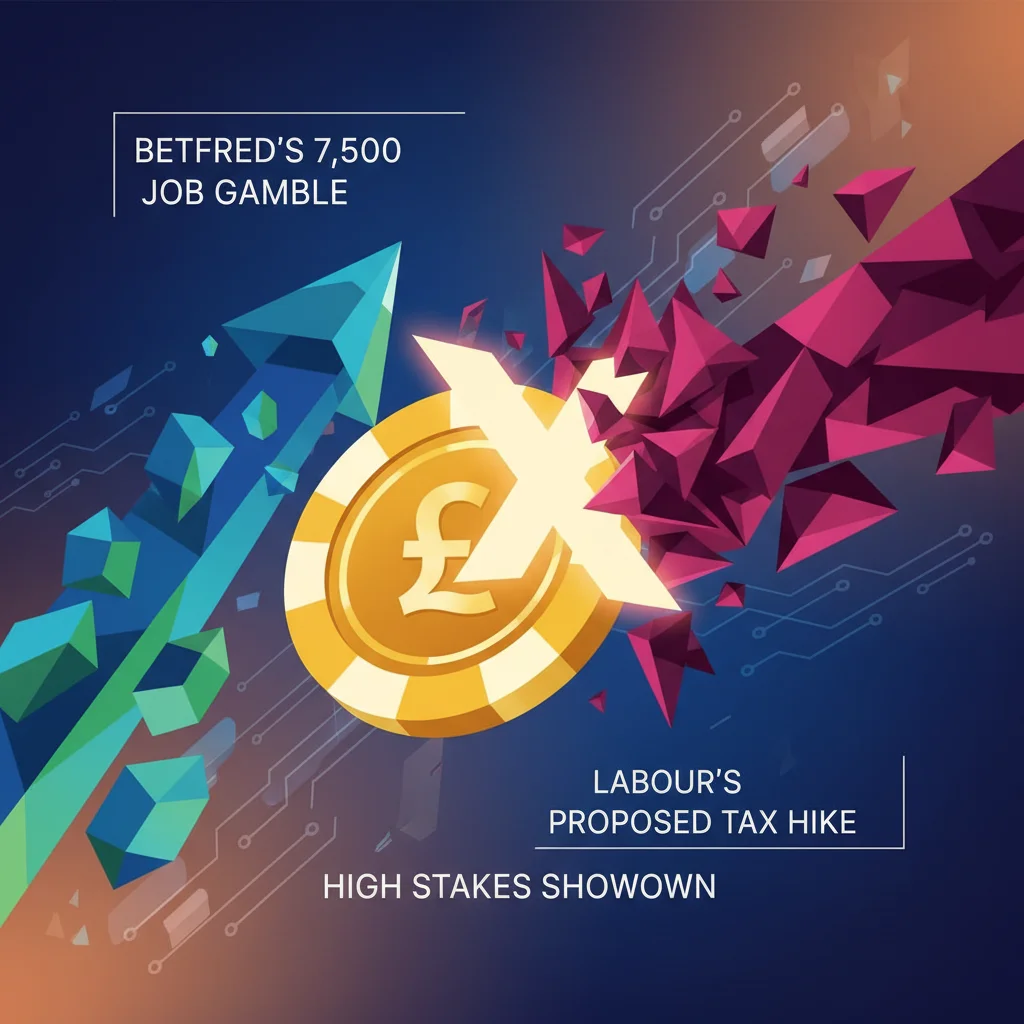
High Stakes Showdown: Betfred’s 7,500 Job Gamble Against Labour’s Proposed Tax Hike
In the high-stakes world of corporate finance and political maneuvering, a dramatic new game is unfolding on the UK high street. Betfred, one of Britain’s most recognizable bookmakers, has laid its cards on the table with a stark ultimatum. The company’s co-founder, Fred Done, has publicly warned that a potential tax hike on gambling by the Labour Party could force the closure of all its physical betting shops. This move, he claims, would put an estimated 7,500 jobs at risk, sending a shockwave through an already fragile UK economy.
The declaration, aimed squarely at Shadow Chancellor Rachel Reeves, transforms a potential fiscal policy adjustment into a high-profile showdown over the future of British retail, employment, and the very economics of the gambling industry. For investors, finance professionals, and business leaders, this is more than just a headline; it’s a critical case study in corporate strategy, political risk, and the powerful forces reshaping our economy. As we delve into the details, we must ask: Is this a credible economic threat born of financial necessity, or a masterful piece of political brinkmanship?
The Anatomy of an Ultimatum: What Betfred is Threatening and Why
At the core of this conflict is a simple but potent proposition: if the government increases the tax burden on its operations, Betfred’s retail business model will no longer be viable. Fred Done’s statement is unambiguous. He argues that the existing margins for high-street bookmakers are already razor-thin, squeezed by rising operational costs, shifting consumer habits, and fierce online competition. A further tax hike, in his view, would be the final straw.
The potential closure of Betfred’s entire retail estate represents a significant threat to local economies. These shops are not just points of transaction; they are employers, tenants in commercial properties, and contributors to local business rates. The loss of 7,500 jobs would have a ripple effect, impacting household incomes and consumer spending in communities across the country. This narrative of job preservation is a powerful tool in any public debate, instantly raising the political stakes for Rachel Reeves and the Labour Party.
The Million Plan to Name Streets: Unlocking Ivory Coast's Fintech and Investment Boom
Demystifying the Gambling Tax Landscape
To understand the gravity of Betfred’s claim, it’s essential to grasp the current tax structure governing the UK gambling industry. The primary levy is the tax on Gross Gambling Yield (GGY), which is the amount retained by operators after paying out winnings but before deducting operating costs. The rates, however, differ significantly across the industry, creating a complex financial ecosystem.
Labour has not yet detailed the specifics of its proposed tax changes, but the party has signaled a desire to harmonize the tax rates between online and in-person gambling. Historically, online gambling has faced a higher GGY tax rate than bets placed in physical shops. The concern from retailers like Betfred is that any “harmonization” would mean raising the tax on their physical operations to match the higher online rate, rather than lowering the online rate.
Here is a simplified breakdown of the current tax environment and the potential impact of the proposed changes:
| Gambling Sector | Current Primary Tax (Approximate) | Potential Change Under Labour Proposal | Implication for Operators |
|---|---|---|---|
| Online Gambling (Remote Betting) | 21% tax on Gross Gambling Yield (GGY) (source) | Likely to remain the benchmark rate. | Continued high tax burden, but stable regulatory environment. |
| Physical Betting Shops (Non-remote) | 15% tax on Gross Gambling Yield (GGY) (source) | Potential increase to “harmonize” with the 21% online rate. | Significant reduction in profitability, threatening the viability of physical locations with high overheads. |
| Gaming Machines (e.g., FOBTs) | Variable rates, up to 25% on GGY. | Could also be subject to review and potential increases. | Further pressure on a key revenue stream for high-street shops. |
This potential 6-percentage-point hike in the GGY tax for retail shops is the financial catalyst behind Betfred’s warning. For a business built on volume and thin margins, such a change could erase profitability overnight, making the economics of maintaining expensive high-street premises untenable.
The Digital Disruption: Fintech, Online Trading, and the Fading High Street
Betfred’s dilemma is not occurring in a vacuum. It is symptomatic of a much larger economic transformation driven by financial technology (fintech). The gambling industry has been at the forefront of this digital revolution. Sleek mobile apps, instant in-play betting, seamless payment integrations, and sophisticated algorithms have fundamentally changed how consumers engage with betting.
The convenience of online platforms has steadily eroded the market share of physical betting shops for years. This trend mirrors the decline of traditional retail and high-street banking branches. From an investing perspective, the growth is overwhelmingly concentrated in the online sector. Companies that have successfully leveraged fintech to create engaging digital experiences have seen their valuations soar on the stock market, while those heavily reliant on physical footprints face mounting pressure.
This technological shift complicates Betfred’s argument. A tax hike might indeed be the final push, but the business model was already on a declining trajectory. An astute observer of economics might argue that the tax is merely accelerating an inevitable market correction. The capital and labor tied up in physical shops could, in theory, be reallocated to more productive, higher-growth digital ventures. The challenge, of course, is the human cost of such a rapid transition.
The Gaza Endgame: Decoding the Financial Stakes of a Fragile Peace Plan
Furthermore, the future of the industry may see even more radical technological integration. Concepts like blockchain are being explored for their potential to bring unprecedented transparency and fairness to online gambling, creating decentralized and provably fair systems that could further disrupt the established order. While not yet mainstream, this illustrates the relentless pace of innovation that legacy models must contend with.
Market Reactions and Investor Outlook
For those involved in investing or trading within the gambling sector, this news introduces a significant dose of regulatory risk. The UK has long been seen as a stable and mature market, but the prospect of a new government with a more interventionist stance creates uncertainty. The share prices of listed gambling firms like Entain (owner of Ladbrokes and Coral) and Flutter Entertainment (Paddy Power, Betfair) are sensitive to such political winds.
Investors will be watching several key indicators:
- Labour’s Final Policy: Any concrete details in the party’s manifesto will cause immediate market movement. A moderate, phased-in approach might be absorbed, while a sudden, sharp hike could trigger a sector-wide sell-off.
- Competitor Reactions: Will other major players like Ladbrokes and William Hill issue similar warnings? A united front would lend credibility to the industry’s claims, while silence might suggest they see a strategic opportunity in a potential Betfred withdrawal.
- Diversification Strategies: The market will reward companies that are not overly reliant on the UK retail market. Firms with strong international online operations are better insulated from this specific political risk.
This situation underscores a fundamental principle of modern finance: political and regulatory landscapes are as important as a company’s balance sheet. The ability to anticipate and adapt to policy shifts is a key determinant of long-term success.
Beyond the Tweet: The High-Stakes Financial Risk of Firing Employees Over Social Media
Conclusion: A Crossroads for Policy, Business, and the Economy
The standoff between Betfred and the Labour Party is far more than a simple dispute over tax rates. It is a convergence of some of the most pressing issues facing the UK economy today: the future of the high street, the impact of digital disruption, the balance between corporate profitability and social responsibility, and the role of government in shaping markets.
Whether Betfred’s threat is a sincere reflection of economic reality or a calculated political maneuver, the consequences are very real. The fate of 7,500 jobs hangs in the balance, and the outcome will set a precedent for how future governments interact with industries undergoing profound technological change. For business leaders and investors, it serves as a stark reminder that in the complex interplay of finance, politics, and technology, the house doesn’t always win.


